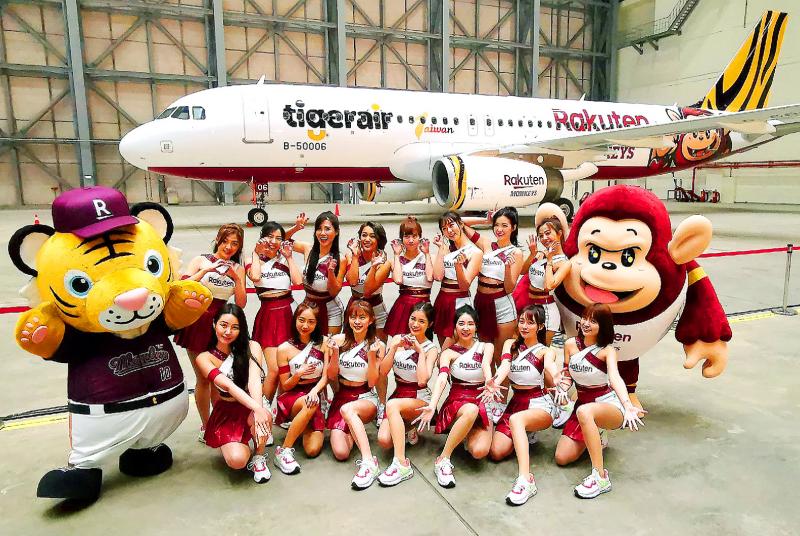The nation’s only low-cost carrier, Tigerair Taiwan Ltd (台灣虎航), has partnered with the Rakuten Monkeys baseball team to offer a tour to Japan’s Miyako Island, as well as cobranded products, to create new revenue streams, the airline said yesterday.
Tigerair repainted one of its Airbus A320 jets and placed an image of the team’s mascot “Rocky” on its body and would use the aircraft for the flight.
Although cruise flights have gained popularity since the outbreak of the COVID-19 pandemic, Tigerair said its package would be different, as Rakuten star players Wang Yi-cheng (王溢正) and Huang Tzu-peng (黃子鵬), as well as the Rakuten Girls cheerleaders, would accompany passengers on the tour.

Photo: Tony Yao, Taipei Times
“Baseball fans can ask for players’ autographs and interact with them and the cheerleaders before boarding, and sing the team’s songs on the airplane as they would at a baseball game. We want them to feel as excited as they are in a stadium,” Tigerair president Steve Chang (張明瑋) told a news conference in Taoyuan.
The flight would be held on April 11 and cost each passenger NT$5,410, Chang said.
The airline would consider a second tour if the response is positive, he said.
Cobranded products — such as jerseys, travel pillows, model airplanes, masks, suitcase covers and mugs — are aimed at aviation enthusiasts and baseball fans, Tigerair said.
It is vital for Tigerair to generate revenue from new businesses or programs to offset the pandemic’s effects on its passenger operations, the airline said.
Unlike other carriers, Tigerair could not pivot to an air cargo business quickly due to a lack of cargo planes, spokesman Bernard Hsu (許致遠) told the Taipei Times.
“Although we have applied to transport the goods in passenger jets’ cabins, the demand for air cargo was not that strong for us, as we mostly fly to second-tier cities in Asia,” Hsu said.
Tigerair, with 11 aircraft, has leased out some of its jets to Mandarin Airlines Ltd (華信航空), which focuses on domestic flights.
The leasing income has become a stable revenue stream for Tigerair, Hsu said, adding that the number of jets it offers would increase with next month’s Penghu International Fireworks Festival.
Tigerair expects a new revenue stream from offering jets and crew to Palau Pacific Airways, which aims to enhance its operation between Taiwan and Palau after the nations established a “travel bubble” last week, Hsu said.
“The number of jets we provide for Palau Pacific Airways would be dynamic and depend on the number of flights from Taiwan to Palau the airline plans to operate,” he said.
Overall, Tigerair has a rosier outlook for this year than last year, expecting border controls to ease in the second half of this year on the back of vaccination programs worldwide, chairman Kevin Chen (陳漢銘) said yesterday.

BYPASSING CHINA TARIFFS: In the first five months of this year, Foxconn sent US$4.4bn of iPhones to the US from India, compared with US$3.7bn in the whole of last year Nearly all the iPhones exported by Foxconn Technology Group (富士康科技集團) from India went to the US between March and last month, customs data showed, far above last year’s average of 50 percent and a clear sign of Apple Inc’s efforts to bypass high US tariffs imposed on China. The numbers, being reported by Reuters for the first time, show that Apple has realigned its India exports to almost exclusively serve the US market, when previously the devices were more widely distributed to nations including the Netherlands and the Czech Republic. During March to last month, Foxconn, known as Hon Hai Precision Industry

Taiwan Semiconductor Manufacturing Co (TSMC, 台積電) and the University of Tokyo (UTokyo) yesterday announced the launch of the TSMC-UTokyo Lab to promote advanced semiconductor research, education and talent development. The lab is TSMC’s first laboratory collaboration with a university outside Taiwan, the company said in a statement. The lab would leverage “the extensive knowledge, experience, and creativity” of both institutions, the company said. It is located in the Asano Section of UTokyo’s Hongo, Tokyo, campus and would be managed by UTokyo faculty, guided by directors from UTokyo and TSMC, the company said. TSMC began working with UTokyo in 2019, resulting in 21 research projects,

Ashton Hall’s morning routine involves dunking his head in iced Saratoga Spring Water. For the company that sells the bottled water — Hall’s brand of choice for drinking, brushing his teeth and submerging himself — that is fantastic news. “We’re so thankful to this incredible fitness influencer called Ashton Hall,” Saratoga owner Primo Brands Corp’s CEO Robbert Rietbroek said on an earnings call after Hall’s morning routine video went viral. “He really helped put our brand on the map.” Primo Brands, which was not affiliated with Hall when he made his video, is among the increasing number of companies benefiting from influencer

Quanta Computer Inc (廣達) chairman Barry Lam (林百里) yesterday expressed a downbeat view about the prospects of humanoid robots, given high manufacturing costs and a lack of target customers. Despite rising demand and high expectations for humanoid robots, high research-and-development costs and uncertain profitability remain major concerns, Lam told reporters following the company’s annual shareholders’ meeting in Taoyuan. “Since it seems a bit unworthy to use such high-cost robots to do household chores, I believe robots designed for specific purposes would be more valuable and present a better business opportunity,” Lam said Instead of investing in humanoid robots, Quanta has opted to invest